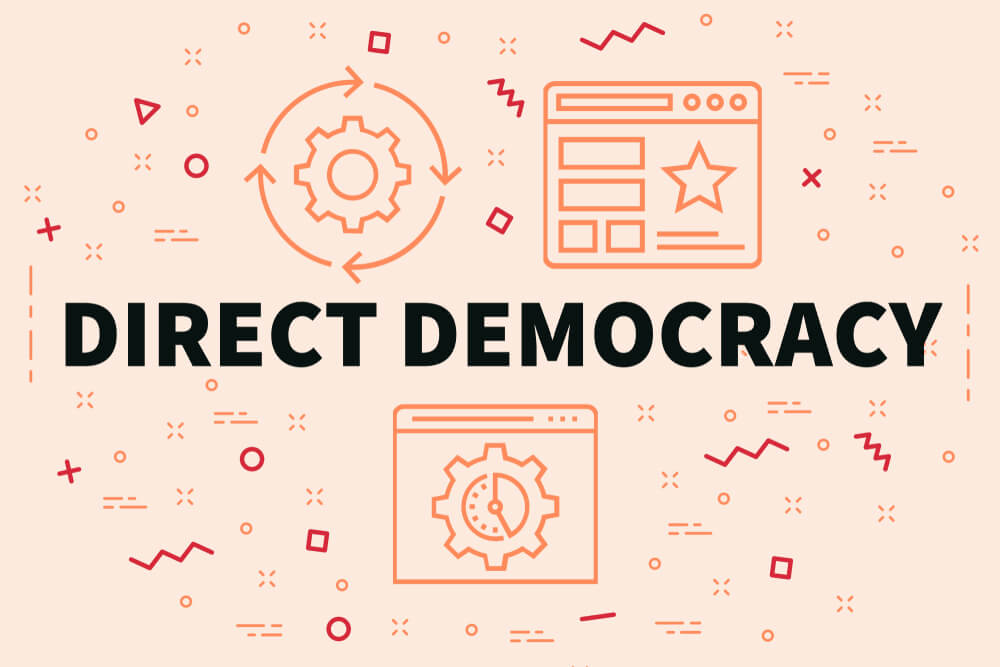Direct democracy allows citizens to directly participate in decision-making, bypassing representative structures. This exploration traces its evolution from ancient Greece to modern applications, highlighting key differences between direct and representative democracy and their impact on today’s political landscape. It also reveals how direct democracy operates globally, offering insights into its significance in contemporary governance.
Introduction to Direct Democracy
Direct democracy is a form of governance that allows citizens to participate directly in decision-making processes, rather than relying solely on elected representatives. This system empowers individuals to vote on laws and policies firsthand, giving them a more direct influence over governmental actions.
To define direct democracy, it’s essential to understand its core principle: the belief that sovereignty should reside directly with the people. Unlike representative democracy, where elected officials make decisions on behalf of their constituents, direct democracy enables citizens to engage in referendums and initiatives that shape legislation.
The meaning of direct democracy extends beyond mere voting; it encompasses active civic engagement and public discourse. By involving citizens directly in the legislative process, this system aims to reflect the collective will more accurately and foster greater accountability within government structures.
In essence, when we ask “what is direct democracy,” we are referring to a democratic framework where individuals have the power not only to elect their leaders but also to decide on specific policies through participatory mechanisms. This approach seeks to enhance transparency and ensure that governmental decisions align closely with the public’s interests.
The Historical Roots of Direct Democracy

The concept of direct democracy, where citizens have a direct say in decision-making processes, traces its origins back to ancient civilizations. The history of direct democracy is most famously associated with ancient Greece, particularly the city-state of Athens. This early form of governance allowed Athenian citizens to participate directly in legislative and judicial matters, setting a foundational precedent for modern democratic systems.
The origins of direct democracy can be pinpointed to the 5th century BCE in Athens. During this period, reforms implemented by leaders like Cleisthenes and Pericles expanded political participation beyond the aristocracy to include all male citizens. This system was characterized by institutions such as the Assembly (Ekklesia), where citizens gathered to vote on laws and policies, and the Council (Boule), which prepared issues for discussion.
Ancient democracy systems were not without their limitations (most notably, women, slaves, and non-citizens were excluded from participation) but they laid crucial groundwork for future democratic practices. The Greek democracy history provides valuable insights into how societies can organize themselves around principles of equality and citizen involvement.
As we trace the historical roots of direct democracy, it becomes clear that these early experiments have profoundly influenced contemporary democratic ideals. Understanding these origins helps us appreciate both the achievements and challenges faced by ancient democracies while recognizing their enduring impact on modern governance structures worldwide.
The Evolution of Direct Democracy (From Ancient Times to Modern Usage)
The evolution of democratic systems is a fascinating journey that traces back to ancient times, showcasing how societies have continually sought to refine and improve methods of governance. Direct democracy, one of the earliest forms of democratic engagement, has its roots in ancient Athens, where citizens actively participated in decision-making processes. This early model laid the groundwork for future democratic practices by emphasizing the importance of citizen involvement.
As we fast-forward through history, the development over time reveals significant changes in democratic practices. The transition from direct to representative democracy became necessary as populations grew and logistical challenges made direct participation impractical. However, modern technology has reignited interest in direct democracy by providing new platforms for citizen engagement.
Today, modern direct democracy examples can be seen in various forms around the world. Switzerland is often cited as a leading example with its frequent referenda allowing citizens to vote on key issues directly. Similarly, digital platforms are emerging as tools that enable more immediate and widespread participation in political processes.
The evolution of democratic systems continues to adapt to societal needs and technological advancements. As we look towards the future, it is clear that both historical insights and modern innovations will play crucial roles in shaping how democracies function globally.
Direct Democracy VS Representative Democracy
In the ongoing debate of direct democracy versus representative democracy, it’s essential to understand the fundamental differences between these two systems of governance. Direct democracy allows citizens to participate directly in decision-making processes, often through referendums or initiatives where they can vote on specific issues. This system is characterized by a high level of public involvement and aims to reflect the immediate will of the people.
In contrast, representative democracy operates on the principle that citizens elect representatives who then make decisions on their behalf. This system is designed to balance efficiency and expertise, as elected officials are expected to have a deeper understanding of complex issues and dedicate their time to governance.
When comparing representative vs. direct governance, each has its pros and cons. Direct democracy offers greater transparency and accountability since decisions are made by popular vote. However, it can be impractical for large populations due to logistical challenges and the potential for voter fatigue on numerous issues.
On the other hand, representative democracy allows for more streamlined decision-making processes but can sometimes lead to a disconnect between elected officials and their constituents’ desires. The effectiveness of this system largely depends on how well representatives align with public interests.
Both forms have unique advantages and limitations that must be considered when evaluating which approach best serves a society’s needs. Understanding these differences helps illuminate why some countries choose one over the other or incorporate elements from both systems into their political framework.
The Role and Impact of Direct Democracy in Today’s Political Landscape
Direct democracy is increasingly becoming a focal point in discussions about modern political systems. Its role in current government frameworks offers both opportunities and challenges, reshaping how citizens engage with policy-making processes. Unlike representative democracy, where elected officials make decisions on behalf of the people, direct democracy allows citizens to vote directly on specific issues or policies. This approach can lead to more engaged and informed citizenry, as individuals have a direct say in matters that affect their lives.
The impact on modern politics is profound. Direct democracy can enhance transparency and accountability within government systems by ensuring that decisions reflect the will of the populace rather than just political elites. This can lead to increased trust in governmental institutions, as citizens feel their voices are being heard and valued.
Case studies in contemporary settings highlight both successes and challenges of direct democracy. In Switzerland, for example, frequent referendums allow citizens to influence policies directly, which has contributed to a highly participatory political culture. However, critics argue that this system can sometimes lead to decision-making paralysis or populist measures that may not always align with expert opinions or long-term strategic goals.
While direct democracy presents an intriguing model for enhancing democratic engagement and ensuring governmental accountability, its implementation must be carefully balanced with considerations for effective governance and informed decision-making.
Key Facts About Direct Democracy That You Should Know
Direct democracy is a fascinating system of governance that allows citizens to have a direct say in the decision-making process. Here are some interesting facts about direct democracy and its operation worldwide that you might not know.
One of the lesser-known facts about direct democracy is its historical roots. The concept dates back to ancient Athens, where citizens would gather in assemblies to vote on important matters. This form of governance was limited to a small population, allowing for more direct involvement in legislative processes.
In modern times, Switzerland stands out as a prominent example of direct democracy in action. Swiss citizens regularly participate in referendums and initiatives, enabling them to influence national policies directly. This system has been integral to Swiss political culture, ensuring that the populace remains actively engaged with governmental decisions.
Another intriguing aspect is how technology is reshaping direct democracy’s implementation across the globe. With advancements in digital platforms, countries like Estonia have experimented with e-voting systems, making it easier for citizens to participate directly from their homes.
Despite its advantages, there are challenges associated with direct democracy. One concern is the potential for voter fatigue due to frequent voting requirements on numerous issues. Additionally, complex policy decisions may require expertise beyond what the average citizen possesses, raising questions about informed decision-making.
Overall, while not universally adopted due to these challenges and varying political cultures worldwide, direct democracy continues to offer an alternative approach by empowering citizens and enhancing democratic participation through innovative methods and practices globally.
The Importance of Understanding Direct Democracy for Informed Citizenship
Understanding direct democracy is crucial for fostering informed citizenship, as it empowers individuals to actively participate in the democratic process. Direct democracy allows citizens to vote directly on policy initiatives and laws, rather than relying solely on elected representatives. This form of governance can lead to more engaged and educated citizens who are better equipped to make decisions that reflect the collective will.
By comprehending the mechanisms of direct democracy, such as referendums and citizen initiatives, individuals gain insight into how their voices can shape public policy. This understanding encourages active participation in civic life and promotes a sense of responsibility among citizens.
Moreover, being informed about direct democracy helps individuals recognize the potential benefits and challenges associated with this system. While it offers a more immediate way for people to influence government actions, it also requires a well-informed electorate capable of making sound decisions on complex issues.
In conclusion, grasping the principles and practices of direct democracy is essential for anyone seeking to be an engaged and informed citizen. It not only enhances individual participation but also strengthens democratic institutions by ensuring that they remain responsive to the needs and desires of the populace.


